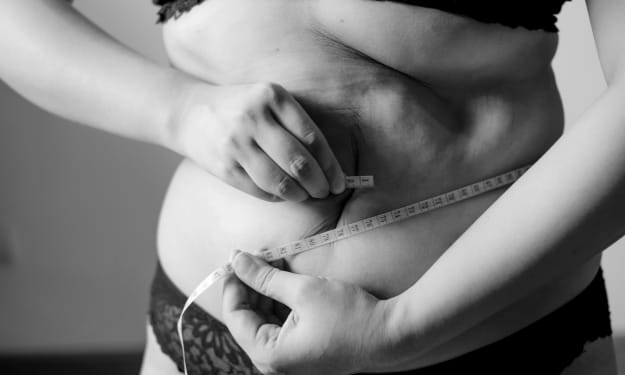My Partner Has PCOS - What Should I Do?
Things that might help the spouse of a woman with PCOS.

It's hard having PCOS, so I can only imagine it's hard to be with someone with PCOS.
I say this as a woman with (polycystic ovarian syndrome) PCOS and who also has a loving supportive partner that I am constantly apologizing to for my moods. If you are in a relationship with a woman who says that she has PCOS, it helps to know what that exactly means. Polycystic Ovarian Syndrome has been known to affect relationships, the woman's self-esteem, and thus ultimately her confidence in even her partners.
So, from someone with PCOS - who has some of the most amazing and supportive people in her life, I'm going to take some key notes of the things that they do that help me tremendously as I deal and manage with this life-long health problem. With their support, I am able to manage myself and my moods much easier.
If your partner has PCOS - it shows just how much you care when you take the time to learn about it.
It helps to start with knowing what Polycystic Ovarian Syndrome is. Click the link, because PCOS is a LOT - and there are a lot of symptoms and things that can happen with a woman with it, so reading that whole article will help you, because I certainly don't have space to explain what PCOS is in this article. Knowledge is half the battle, and knowing more about her symptoms and the side-effects these symptoms have on her can help you deal with whatever her body is throwing at you today - whether that is mood swings or physical pain, you can at least be prepared.
Be Patient About Intimacy
When a woman has PCOS, you never know what her libido is going to do. One week she could be ravenous in sexual appetite, and then she could go three months needing nothing, and you have to take the extra mile to initiate. Make sure you keep an open line of communication in your relationship about your intimacy and how you're both feeling in regards to it. It never hurts to express your desires to your partner if things are a little lacking, and maybe find ways to get creative about sexy times so that you both maintain the intimacy and physical connection in your relationships.
Expect To Be A Pillar She Leans On
As with any relationship, both of you should be able to lean on each other appropriately during times of duress. However, a woman with PCOS will need an extra supportive partner. From depression, to anxiety, mood swings, emotional decay, insecurity and self-consciousness about both her whole existence and the way her body looks, there will be days where she is your AND her own biggest enemy. And there will be days it's hard for her to get out of bed or get things done. Not only does she suffer from chronic fatigue, but there are days where she is in immense pain that comes in waves.
Be the person she's secure with.
Help her with her self-care routine. Be mindful about what she's insecure with - and reassure her that it's okay. By this time in your relationship, she's either already secure around you, or she's not. I personally would never get with a man who made me feel anything but comfortable, but there are some women out there that will endure self-centered douchebags. But you should be able to gauge how she reacts around you and be able to tell if she's fully comfortable around you with her PCOS body.
If you're not, you should fix that. And you can do that of being mindful of her insecurities. Reassure her that they are not flaws, and that you love her anyway. At the end of the day, being the person who makes her feel loved and wanted despite all the things she thinks is wrong with her, does a LOT more for a girls self-confidence than you think. You will directly help guide her self-image towards something positive - and that is vital for... well anyone, really.
Take her mood swings with a grain of salt.
It takes a LOT for a woman with PCOS to learn to maintain her temper and stabilize her moods. For me, it was 90 MGs of Effexor every day for years. And yeah, from what I understand that's a very large dose for an anti-anxiety/depressant.
And if your PCOS princess hasn't found her method of zen when her moods are out of whack, that means it's up to you to not take the things she says personally. I am in no way saying put up with behavior that is harmful or abusive in any form but ignore her when she's bitching about everything and hug her when she's crying over everything. Hormones are mood killers. Be patient, and don't take things personally.
Fertility Is Probably A Sensitive Subject
Listen. I am not going to lie. It's harder for women with PCOS to get pregnant. And many doctors have a way to telling women who suffer from polycystic ovarian syndrome to give up hope - even if that's not what they mean.
Women who have PCOS may have several miscarriages before an embryo manages to make it. They may have fertility issues where getting pregnant is harder. Making babies is, most times, unless the woman doesn't want kids, a very triggering topic for their depression. Oftentimes she will act happy for those around her who will get pregnant, but you'll be the one holding her that night in bed while she cries and apologizes to you that she can't give you a family.
If you don't want children, and you are with a woman who desperately wants children even though she has PCOS, it is NOT a reason to not be honest about that and just hope for the best. Because no matter what a doctor says, until that woman has had a hysterectomy there is ALWAYS a small chance that her body can do the baby thing. Especially if she does will with her health routine and keeps her weight manageable.
And if you do want children, reassure her that you guys will work out solutions to any problems, together. And work with her, support her, and aid her in whatever route you guys decide. There won't be anything you can say to help soothe her with this particular wound. Just be prepared for anything, and don't let her convince you that her body is sterile.
Encourage her to self-care and check in with her doctors.
This seems obvious. But until her symptoms are under control and her life is easier, she needs to be checking in with her doctors. These regular visits will probably conclude to blood tests, ultrasounds, weight check-ins, frustration, her feeling like all they do is tell her to lose weight (which they do because weight loss is the KEY to shocking your symptoms into remission)
Other than that friend, not much else to do for her. Love her through her good and bad days - and expect days where getting out of bed is hard for her, not only because she is fatigued, but there are also days of pain.
Just try to be as understanding as possible.
Read my compilation of every article on PCOS I have ever written here!
Time is precious, thank you so much for taking some to read my article. I hope you enjoyed it and it proved useful in some way!
Find my fictional fantasy book "Memoirs of the In-Between" on Amazon in paperback, eBook, and hardback.
You can also find it in the Apple Store or on the Campfire Reading app.
Thanks for your support!
About the Creator
Hope Martin
Find my fictional fantasy book "Memoirs of the In-Between" on Amazon in paperback, eBook, and hardback.
You can also find it in the Apple Store or on the Campfire Reading app.
Enjoyed the story? Support the Creator.
Subscribe for free to receive all their stories in your feed. You could also pledge your support or give them a one-off tip, letting them know you appreciate their work.






Comments (2)
The best thing would be to get clued up on nutrition - especially how consuming animal flesh and bodily fluids disrupt the human hormonal system and create imbalance. This can be healed within months (it took me about a year, but I had a lot of other acute trauma related stress to overcome also) through correct nutrition and creating the additional conditions for health (sleep, meditation, conscious breathing, connection to self and nature, somatic exercises, yin yoga). If the body is sick, we are living in patterns of disease. Those patterns are disrupted when we educate ourselves and make new choices…. 🤍🤍
I love this as a married man to a wife with pcos.